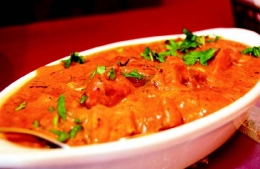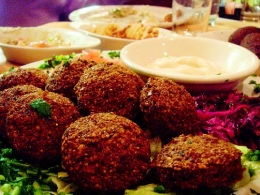Ken Doherty takes a tour of some of Dublin’s multitude of ethnic restaurants and shows how for many immigrants, the connection to their culture and traditions is kept alive through the prism of food
Approaching Adnan Hameed’s Madina restaurant on Mary Street, thoughts of national identity and how food plays a part in reviving it are obvious. Passing under its brightly lit neon sign, the unmistakably sweet and warming scent of spices gently fills the small dinning room. For Hameed and his family, it must smell just like home.
Hameed’s lineage in the food business goes back to his grandfather. He opened the first Indian restaurant in Navan in the late 1950s, he recalls, and later his son, Hameed’s father, established a restaurant on O’Connell Street in the late 1970s. But as in most Indian and Pakistani households, a matriarchal spell was cast over the food. “My mother came in when we opened. She was the main person to teach the chefs,” says Hameed.
This spell released a trove of authentic recipes to a wider public. The spicy northern Punjabi and Madrasi cooking, and the more vegetable-based southern cuisine of Kerala, are as real as they come. And the halal Irish lamb they use is (uniquely for local tastes) served on the bone. This imparts a deeper and richer flavour, according to Hameed.
This search for a sense of place and identity through food is echoed across the city. Tucked away from the hum of the city centre, on Mountjoy Street, is the Nigerian restaurant Decency, an establishment with the feel of a neighbourhood local.
The owner, Regy Kanu, is fully aware that food is an umbilical chord connecting the diaspora to their place of origin.
“When you are far away from home, the tendency that your fellow Africans will want to have the kind of food that they have back home is paramount,” he says.
Kanu is keen to point out that having a restaurant “portrays a typical identity” where food can proudly express a more pronounced and hospitable form of nationality. And the brimming trade at Decency, particularly at weekends, is testimony to this.
Indeed, the restaurant attracts people from across the African continent. Many come for the pounded yam, Kanu remarks, which is usually eaten with a generous bowl of soup. This meal is a very emotional one, as it perfectly signifies the life they have left behind. African people want heavy food to get them through the day, Kanu explains, and heavy food like yams and moi moi (ground beans mixed with spice and cooked in foil) are typical Nigerian and west African staples.
When it comes to foreign cuisine, one of the most represented in Ireland is Chinese food. And it’s on Moore Street and Parnell Street in Dublin city centre where a growing and insatiable expat community can find whatever reminds them of home. With nary a chicken ball in sight, these streets have become the self-proclaimed ‘belly of Dublin’.
The China House on Parnell Street was one of the loudest in proclaiming this new sense of cultural prominence. Wei Liu, who set up the restaurant over 10 years ago, serves authentic Chinese food that does not compromise to any local sensitivities. Showcasing delights from the Shenyang province, near the Korean border, is Liu’s way of combating any fears of losing identity in an environment of many cultures.
According to Liu, recent activity in the restaurant has been slow, and with taxes, bills and salaries to take into consideration, the future looks less than secure. However, as we spoke a lunchtime tide of revelry was filling up the small but utilitarian dinning room.
Even after 10 years, Liu remains “very proud of the food here”. Judging by the happy customers gathering around us, the feeling is mutual. Satisfied customers are the barometer by which any restaurant should be judged. And by that criteria, this looks to be one of the best eating establishments north of the Liffey. Favourites here include huo guo (lamb hotpot) – a shared, convivial experience where you fish out your own meal from a steaming bowl that sits in the centre of the table – and the cold pig’s ear salad with scallions, a rubbery (and slightly hairy) joyride of the senses.
Senses of another kind wash all over those who enter East, a Korean restaurant south of the river in trendy Temple Bar. Tucked away in shaded Crane Lane, with striking red booths in the dining area, it feels like the rendezvous point in a swooning Wong Kar Wai movie. Owner and chef Moon Lee might have a weakness for retro design, but there is no denying his knowledge and affection for Korean food.
East is situated in an area not renowned for its Far Eastern cuisine. “It’s more of a challenge to have a restaurant in Temple Bar,” says Lee, but after “preparing for two years” to open in Dublin, he seems determined for East to succeed in what is now a very difficult time for new restaurants. He explains that he is “proud and honoured” to introduce his food to Irish people.
Like Ireland, Korea’s identity is usually overlooked for its more illustrious neighbours – in Korea’s case, China and Japan. Lee explains that Korean food is “spicier than Chinese food” and while in the west sake and sushi are seen as Japanese, in his homeland they are proudly tied in with a Korean sense of solidarity with its history.
Lunchtime at East sees Lee use his culinary talent to manifest his strong cultural identity. Usually Korean mains, like tchigae (stews), come with a dazzling and nutritious number of sides (banchan), and East is no exception. Kimchi (spicy fermented cabbage), lotus root and jhutkal (salted fish) are all subtle and nimble feats of expression.
The Rotana Café in Portobello, near the Grand Canal, specialises in Lebanese and Palestinian cuisine. Food writer Christiane Dabdoub Nasser, in her book Classic Palestinian Cuisine, points out that Palestinian food has been deprived of its own specificity within the Middle East. The Rotana Café tries to redress this.
Formerly one half of Christy Bird’s antique shop, Rotana has become a shared meeting point for the Palestinian and Lebanese communities in Dublin. Palestinian owner and chef Mohammed Abbuissa admits that he “misses home a little less because of what I do”.
Homemade falafel (“Made in Palestine in the beginning,” says Abbuissa), manakeesh (Lebanese pizza), foul medammes (fava and garbanzo bean dip) and lamb kefta all contribute to a cuisine that can be traced back, says Abbuissa, through 400 years of Ottoman imperial rule.
When starting the restaurant, the biggest difficulty Abbuissa encountered was getting the right taste. Irish lamb, for instance, is a very different animal to what he was used to from home. “They have a bigger rear and a different smell,” he says of Irish lambs. “The weather is important for the growth of meat.”
Abbuissa is part of the Palestinian and Lebanese diaspora who use their culinary heritage and tradition to show off their uniqueness, escaping the shadow of the ‘Middle Eastern’ umbrella. Yet they are not alone in their battle to maintain their cultural individuality. Dublin is a dense cultural mosaic where identity, without an ally, can struggle to find any meaningful existence. But backed by tradition, food becomes that ally.
The restaurants visited here, and many more, serve as proof that a country’s cuisine has become far more adept at keeping its culture alive than anything else. n
Madina
60 Mary Street, Dublin 1
Tel: 01 872 6007
Decency
40 Mountjoy Street, Dublin 7
Tel: 01 830 8320
China House
139 Parnell Street, Dublin 1
Tel: 01 860 3260
East
19 Crane Lane, Dublin 2
Tel: 01 764 5136
Rotana Café
31 South Richmond Street,
Portobello, Dublin 8
Tel: 01 475 9969













